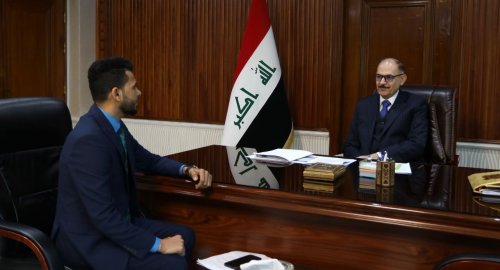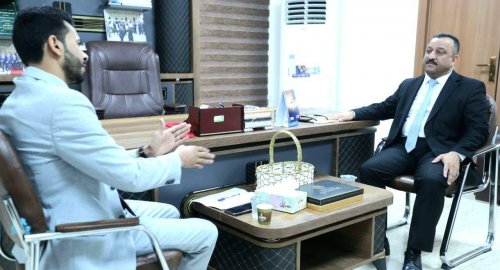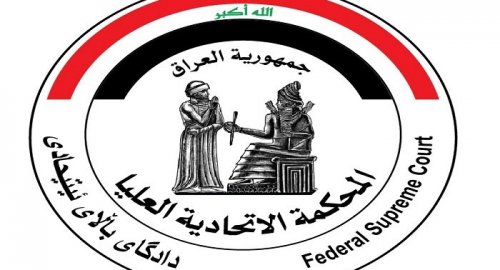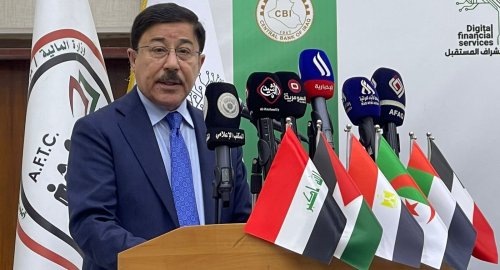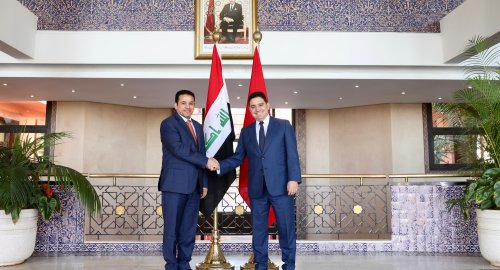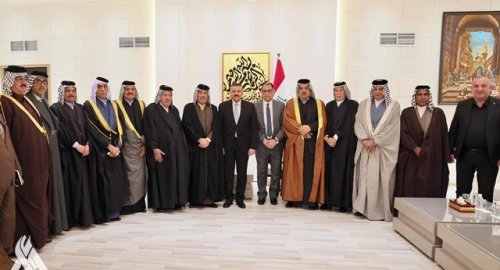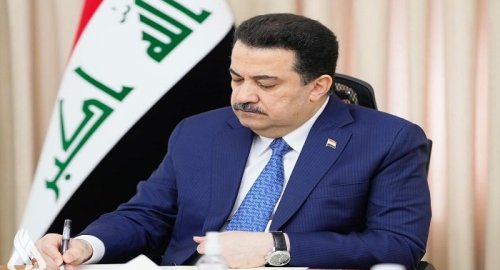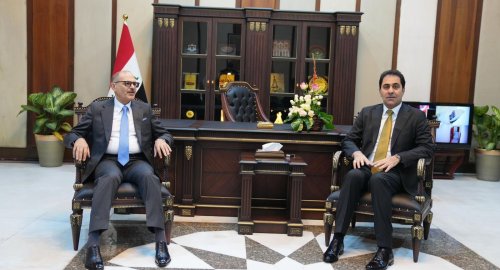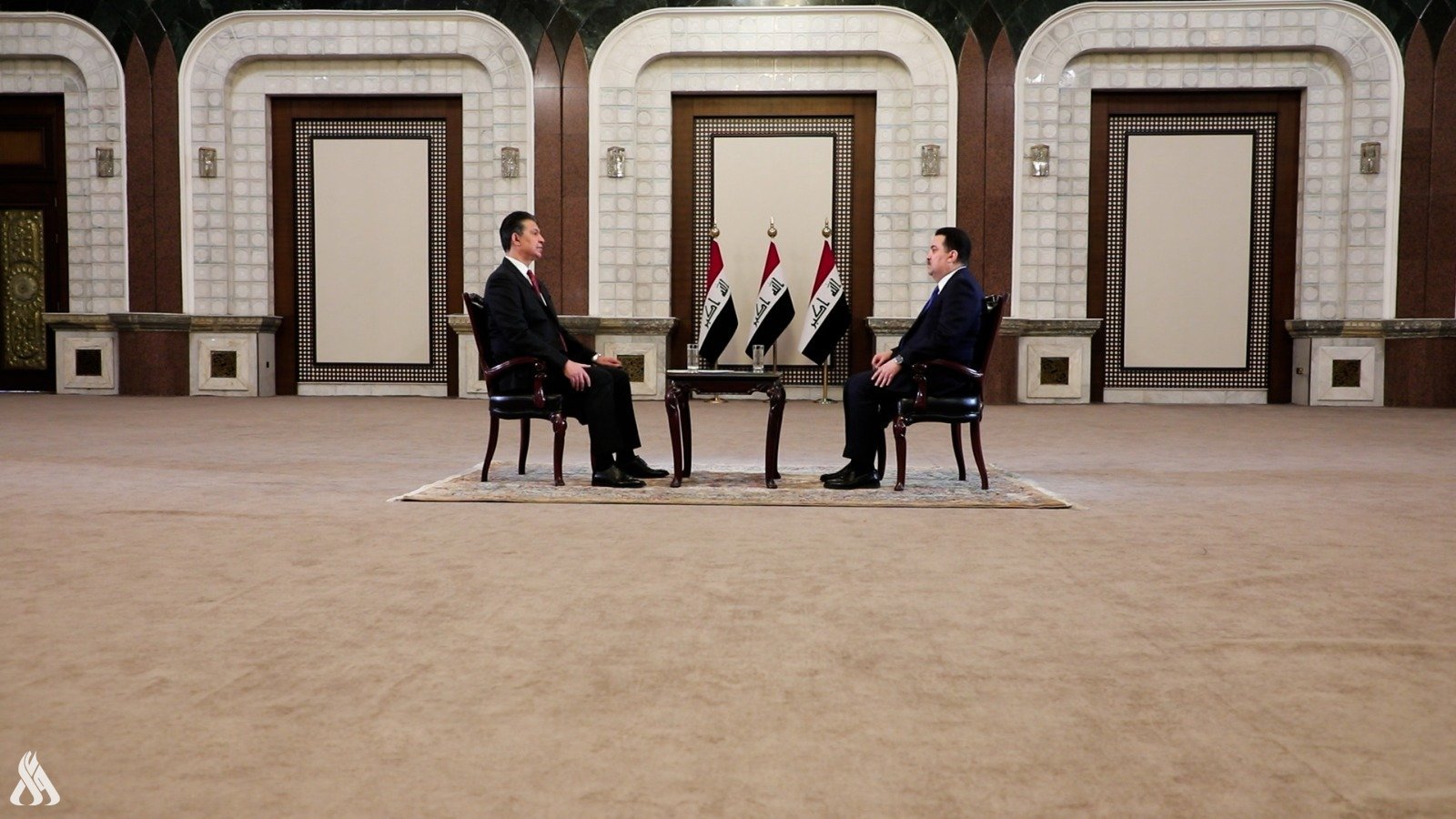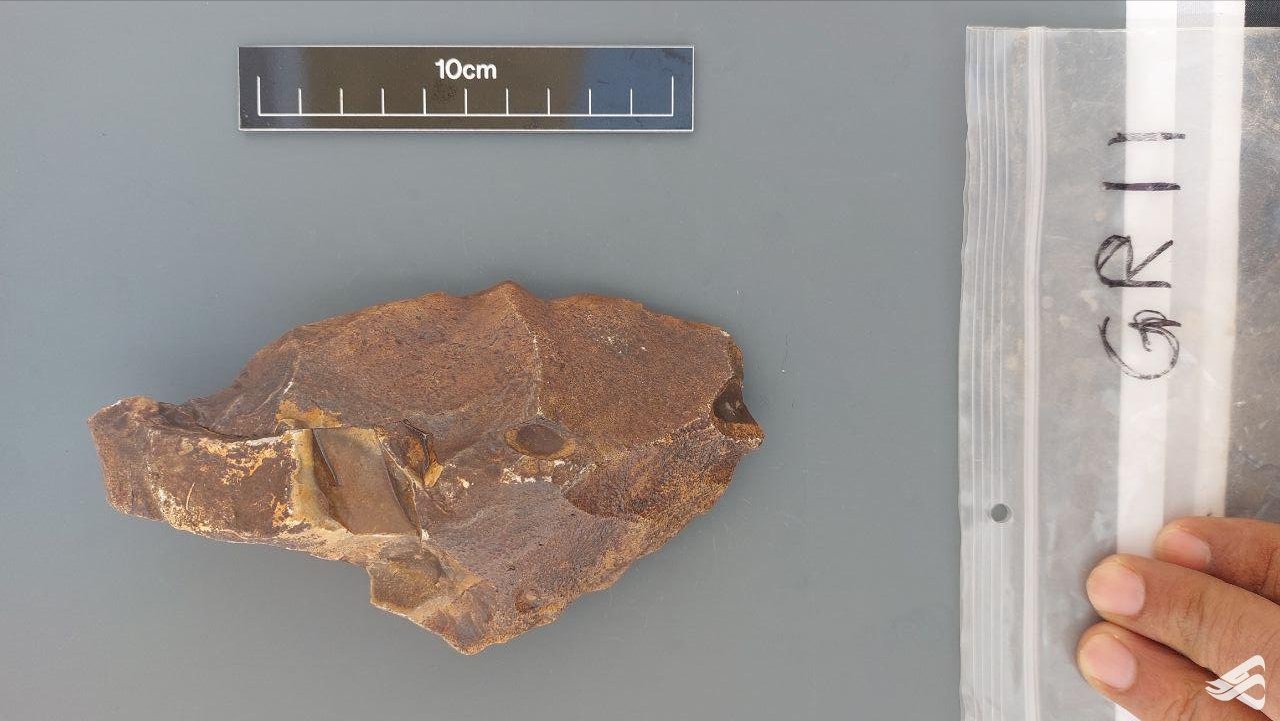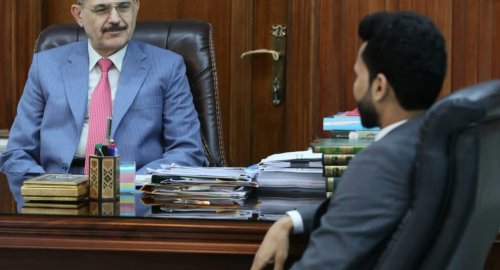
INA discusses with the FSC President 6 files, most notably the elections and curbing corruption

- 6-10-2023, 13:57
Baghdad-INA
The Federal Supreme Court-FSC elaborated on Friday its decision regarding Khor Abdullah Agreement, while indicating that its decision regarding Kirkuk Operations Command HQ was based on the principle of maintaining the security situation.
Iraqi constitution
The president of FSC, Judge Jassem Muhammad Abboud, told the Iraqi News Agency (INA), “The system of government in Iraq after 2003 is completely different from what came before it, as it was a system based on individual rule. The ruler at that time considered himself to be the state, and the citizens were subjects of the ruler, rather than being nationals of the state.”
"After the great sacrifices exerted after 2003 and after the former regime was overthrown, Iraq has completed a very important constitutional document, the 2005 Constitution of the Republic of Iraq", noting that "Under this Constitution, the system of government in Iraq under article 1 of the 2005 Constitution is a republican, parliamentary and democratic. This Constitution is a guarantor of the unity of Iraq. The purpose of the Constitution is to create a democratic government based on the principle of separation of powers, in accordance with article 47 of the Constitution, for the interest of the people and the guarantee of the unity of Iraq,"
"Article 2 of the Constitution states that Iraq is a multi-national, multi-religious and multi- ethnicities. and is a founding and active member of the League of Arab States and committed to its Charter Arabic and Kurdish are official languages under the Constitution. It is possible for each governorate or more, for governorates not organized into a region, to be a region, but within the framework of the principle of preserving the unity of Iraq,” pointing out that “the Iraqi constitution relies on the principle of separation of powers, as the federal authorities in Iraq consist of legislative, executive, and judicial authorities.”
He stated that "Under the Constitution, the Judiciary has been characterized by complete independence from the legislative and executive powers, and under articles 89, 87 and 88 of the Constitution the Judiciary obtained the institutional and individual independence", stating that "institutional independence is the independence of the judiciary from the legislative and executive branches, and individual independence is the independence of judges in their work from any external influence".
He stressed that “the independence that characterizes the judicial authority in Iraq is unique that may not be found in all countries of the Middle East,” and this independence may be distinguished from the independence of the judiciary in many European countries, He explained that "in many Arab and European countries, the person who heads the judiciary is the Minister of Justice, and therefore this is considered part of the executive side, but in Iraq, the independence of the judiciary is complete from the executive and legislative authorities."
He stated that “the Iraqi Federal Supreme Court, in accordance with Article 92, is a judicial body that is financially and administratively independent of all authorities, and therefore it exercises its work in accordance with this independence, and in accordance with the powers granted to it in accordance with Article 93 of the Constitution,” explaining that “among these powers is to consider... The constitutionality of the laws and regulations in force according to what is stated in Clause First of Article 93 of the Constitution.”
Khor Abdullah Agreement
He stated, “With regard to the Federal Court’s decision on the issue of Khor Abdullah, the court saw that the law of ratifying the agreement violated the provisions of Article 61/Fourth of the Constitution of the Republic of Iraq for the year 2005, and therefore it ruled that the law of ratifying the agreement was unconstitutional thus the agreement was unconstitutional too,” explaining that “Clause Four required regulating the process of ratifying international agreements by a law enacted by a two-thirds majority of the members of the parliament.”
"The Ratification of International Conventions and Treaties Act, No. 111 of 1979, was in force at the same time as this Convention was ratified, but the entry into force of the Act does not mean implementing it if it is contrary to the Constitution." He added. “In the event that the Act is unconstitutional, and in the event of an appeal to the Federal Supreme Court, the Court found that the Act was unconstitutional or was repealed after the enactment of an alternative law by the parliament."
He explained that "the Court balanced the constitutionality of the law with Iraq's interest in being a founding and effective member of the League of Arab States and bound by its Charter", noting that "under the Constitution, Iraq is committed to building good-neighborly relations with all neighboring States."
"This agreement does not have a significant impact on good-neighborliness, as the historical relations between Iraq and neighboring States are even greater", he said, explaining that "Iraq has historical and old relations with Kuwait, whether on the popular or official levels".
He stated that "the former regime entered Kuwait in violation of all international norms and conventions and in violation of the principles of good neighborliness. This does not mean that the Iraqi people committed but rather it was the mistake of the head of the regime, not the Iraqi people," pointing out that "the regime at that time, he was an authoritarian individualist who believed that the state was embodied by its head, and he was the President of the Republic at that time, and he transformed citizens from working in the interest of the state into working in the interest of the regime in Iraq.
He stated that "after 2003, the rulers and citizens became equal before the law, and therefore those who currently govern Iraq are not immune from the law, but the law holds the ruler and the convict accountable when the ruler and the convict commit any violation against the people and the homeland.” This unique democratic system in Iraq has been able since 2003 till now to overcome many obstacles and has been able to build constitutional institutions based on democratic principles of State-building, There are many disadvantages, but currently, Iraq is better placed than many neighboring and non-neighboring countries in terms of individuals' living standards or democratic institutional building."
He explained: "There may be corruption, but the Iraqi people reject all the values of corruption by their supreme historical values. Iraq is a great country, and it comes from the greatness of the Iraqi people," stressing that "95 percent of the Iraqi people reject corruption, and they have very high values and principles."
The Judiciary's efforts to curb corruption
"There is a great effort to eradicate corruption made by the Iraqi government and the Judiciary to eradicate corruption” Judge Abboud confirmed. “The Supreme Judicial Council has an intensive plan to fight corruption, as the people reject all the values of corruption. The Iraqi people have high moral, political, social and national principles ".
He pointed out that "there is progress in the fight against corruption, even if it is slow, but it is with steady steps, and its effects will be produced soon, and the Iraqi people are touching the issue of fighting corruption just as they are currently touching the great role played by all state agencies in providing service projects and achieving security and stability in the country."
He stated that "dealing with the issue of any financial implications for Iraq from Khor Abdullah Agreement is the responsibility of the government, and we support any effort or action in the interest of the people and Iraq, the stability of the country, and building good relations with all neighboring countries."
Kirkuk Operations HQ
The President of the Federal Supreme Court affirmed that "Kirkuk is an Iraqi governorate comprising Arabs, Kurds and Turkmen. The coexistence of these nationalities is historic, and national. He pointed out that" Kirkuk remains in this coexistence whatever the circumstances surrounding it. Kirkuk has great value due to its geographical location. "
"When the Supreme Court took the decision to issue the state order on the suspension of the handover of headquarters to a political entity, it proceeded from the principle of maintaining the security situation and peaceful coexistence in Kirkuk, not for another purpose as promoted by some media outlets," he said, noting that "the Iraqi people have full confidence that the coexistence of nationalities in Kirkuk is historic and will continue".
He stressed: "we support any national governmental decision concerning Kirkuk", pointing out that "if the Federal Supreme Court considers that the decision is otherwise and leads to the same positive results, the Court will proceed in the same direction as its aim of maintaining security and the unity of the Kirkuk people".
Election Law
He explained that "Provincial councils are constitutionally elected local bodies, and therefore Iraq's federal system consists of a capital, a province, and decentralized governorates", stating that "the Constitution grants the governorates not incorporated into a region broad financial and administrative powers based on decentralized administration rather than political administration".
He stated that "the Constitution was keen to build it on the basis of administrative decentralization and not on the basis of political decentralization, and the right to elect, vote and nominate are among the constitutional rights guaranteed by the Constitution and which all Iraqi people must enjoy," pointing out that "these elected local councils are stipulated in accordance with the Constitution".
He stressed that "there is an appeal against the election law and several lawsuits were filed with the court, most of which were rejected, and some of them are pending consideration," explaining that "most of the important lawsuits were settled by the court."
Suspending some budget items
He explained that "all the lawsuits filed against the General Budget Law were settled," pointing out that "work began on the Budget Law and was published in the Official newspaper."
Real estate prices
He added that "the rise in real estate prices is outside the jurisdiction of the court, as it jurisdiction is constitutional," pointing out that "the rise in real estate prices is related to the economic and executive aspects, the economic situation in Iraq, and the standard of living in Iraq."
The right to own property
He stated that “Under the Constitution, Iraqis have the right to own property anywhere in Iraq, as do the rest of the rights mentioned in the Constitution, as Article 41 of the Constitution stipulates that Iraqis are free to adhere to their personal status according to their religions and sects, and also Article 42 stipulates Each individual shall have the freedom of thought, conscience, and belief., and Article 43 of the Constitution, which stipulates that the followers of all religions and sects are free in the: Practice of religious rites, including the Husseini rituals and Management of religious endowments (waqf), their affairs, and their religious institutions, and this shall be regulated by law..”
He stressed that "the Constitution stipulates that an Iraqi has the right to own property anywhere in Iraq, and he may not be deprived of that. Therefore, any party, whether in the governorates not organized into a region, in the region, or in the capital, that prevents any citizen from the right to own property is considered a constitutional violation," pointing out that “This right is guaranteed by the Constitution.”
State-building
"Iraq, throughout its history and its people, represents the cradle of civilization, as the Iraqi people are great in their human, moral and national values and have great pride in their patriotism." FSC president confirmed. “Iraq is building a strong civilian State that works for the benefit of the Iraqi people, works for the purpose of equitable distribution of the country's wealth, is based on the building of strong and good-neighborly relations with all neighboring States and is based on working for the people and for that country."
US Central Command: We killed ISIS terrorist leader Abu Yusuf in Syria
- International
- 24/12/20
Liverpool compete with Real Madrid to sign Olympique Lyonnais star
- Security
- 24/12/19
Hackers exploiting Microsoft Teams to gain remote access to user’s system
- Multimedia
- 24/12/17
The discovery of Pre-Christian human settlement sites in Iraq
- Investigations and reports
- 24/12/18
